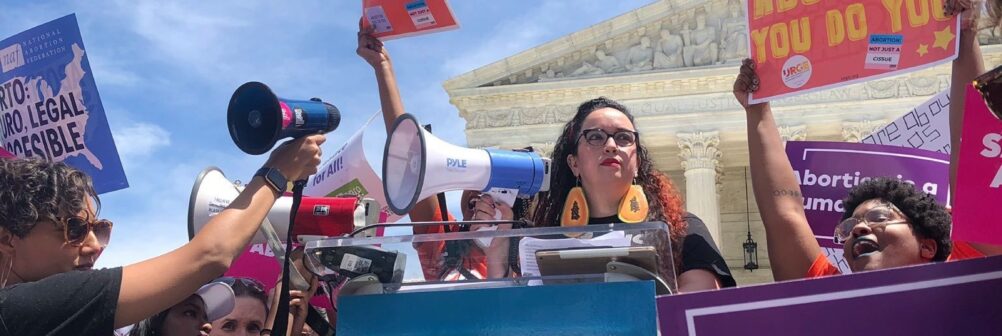Youth Poised as Leading Voting Force: New Poll Underscores Their Firm Commitment to Voting
March 21, 2024
urge@fenton.com
Contrary to prevailing narratives, young people have not opted out of the electoral process nor lost their faith in the efficacy of voting. Instead, they assert their power in shaping the future of abortion access and influencing elected officials to do the same.
(Washington, DC) – This week, URGE: Unite for Reproductive & Gender Equity launched its Young People’s Reproductive Justice Policy Agenda (YPPA), initially released in 2020, identifying six issue areas that young people want policymakers to focus on. The YPPA captures the top policy concerns of youth in the aftermath of the pandemic, ongoing racial justice movements and key judicial rulings, particularly the 2022 Dobbs decision. A new, concurrent poll affirms the YPPA’s policy issue areas and recommendations.
URGE, a national Reproductive Justice organization centering young people of color, commissioned HIT Strategies, a leading polling firm owned and led by millennials and BIPOC individuals, to conduct a national survey of young, registered voters ages 18-30. The survey aimed to gauge young people’s policy priorities and their support for Reproductive Justice issues, motivations and enthusiasm around voting, and receptiveness to different messaging strategies. The polling data echoes the YPPA’s findings – young people are primarily concerned with the economy and cost of living, access to healthcare, mental health, gun violence, and abortion rights and access. The breadth of issues youth cited is a testament to the diversity of backgrounds and experiences of respondents rejecting a single-issue framework.
The most compelling findings from the poll include:
- A significant majority of young voters (74%) nationally expressed intent to vote in the upcoming 2024 elections. are planning to vote in 2024.
- Emotions of “hope” motivate a majority of young voters (63%), outperforming sentiments of anger.
- Young voters think of themselves not as isolated individuals, but as a powerful voting bloc with substantial “collective power to make change.” 44% of respondents gave young people as a community a high-power rating (between 7-10).
- Despite the uptick in anti-abortion laws post-Dobbs, strong support for abortion rights persists among young people, with 59% outright supporting abortion and 30% opposing governmental interference in abortion.
- Amidst ongoing assaults on transgender rights and healthcare, young people oppose these efforts. Nearly half (45%) advocate for greater political protections for transgender rights, while 52% said they would feel more favorably towards their congressperson if they supported protecting transgender people from discrimination.
- There was a near consensus in support of affordable access to healthcare, with 86% of the audience supporting it and 71% strongly supporting it.
- The top reasons cited for voting include: so they can “choose candidates that represent [their] values,” (42%) because “voting is a way to change things that matter to [them],” (37%) and “To make [their] voice heard” (33%).
“More and more young people are demonstrating that reproductive justice is a defining issue for their generation. Young people are at the ballot box, on social media, and in the streets are communicating that scare tactics won’t work on them,” commented Serita Fontanesi (she/her), URGE’s Integrated Voter Engagement Director. “Our key to success is supporting young people in harnessing their collective power by providing them with reliable information, connecting them to community resources, and giving them opportunities to speak up and speak out against anti-abortion, transphobic, racist, and otherwise hateful legislation.”
“Young voters are engaged in politics and passionate about making their voices heard,” said Ashley Aylward, Research Manager at HIT Strategies. “As a generation they come together to show overwhelming support for the policies in URGE’s Young People’s Reproductive Justice Policy Agenda, including cost of living, gun violence prevention and abortion rights. Young voters have the collective power to achieve these policy changes, and our job as strategists is to empower them to demonstrate their strength in numbers.”
The survey consisted of 1000 registered voters nationally, with 4 National Oversamples: Online n100 AAPI, Online n100 Black, Online n100 Latine, Online n100 LGBTQ, and 6 State-Based Oversamples: Online/Phone/TTW n300 AL, Online n250 CA, Online/Phone/TTW n300 GA, Online/Phone/TTW n300 KS, Online/Phone/TTW n300 OH, Online/Phone/TTW n250 TX. The survey was conducted via online panel, text-to-web, and phone and fielded from February 2-12, 2024. The margin of error is +/- 2.68% and is higher among subgroups.
About URGE: Unite for Reproductive & Gender Equity
URGE: Unite for Reproductive & Gender Equity is a national nonprofit organization that works to build young people’s power around reproductive issues by centering the leadership of young people of color who are women, queer, trans, nonbinary and people of low income across the South, Midwest and California. To learn more, please visit urge.org.
###

